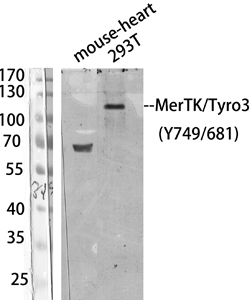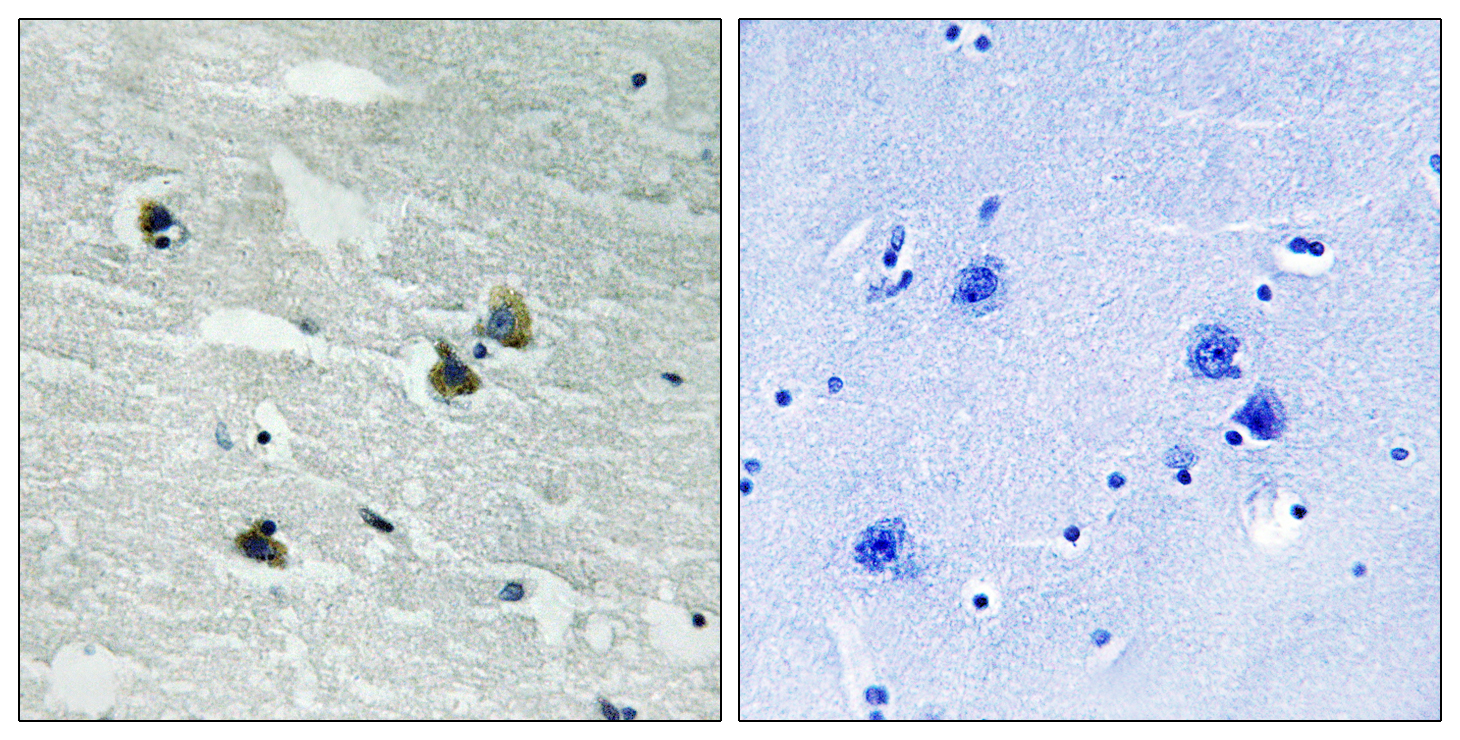MerTK/Tyro3 (phospho Tyr749/681) Polyclonal Antibody
- Catalog No.:YP0788
- Applications:WB;IHC;IF;ELISA
- Reactivity:Human;Mouse;Rat
- Target:
- MerTK/Tyro3
- Gene Name:
- MERTK/TYRO3
- Protein Name:
- Tyrosine-protein kinase Mer/Tyrosine-protein kinase receptor TYRO3
- Human Gene Id:
- 10461/7301
- Human Swiss Prot No:
- Q12866/Q06418
- Mouse Gene Id:
- 17289/22174
- Rat Gene Id:
- 65037/25232
- Rat Swiss Prot No:
- P57097/P55146
- Immunogen:
- The antiserum was produced against synthesized peptide derived from human MER/SKY around the phosphorylation site of Tyr749/681. AA range:716-765
- Specificity:
- Phospho-MerTK/Tyro3 (Y749/681) Polyclonal Antibody detects endogenous levels of MerTK/Tyro3 protein only when phosphorylated at Y749/681.
- Formulation:
- Liquid in PBS containing 50% glycerol, 0.5% BSA and 0.02% sodium azide.
- Source:
- Polyclonal, Rabbit,IgG
- Dilution:
- WB 1:500 - 1:2000. IHC 1:100 - 1:300. ELISA: 1:10000.. IF 1:50-200
- Purification:
- The antibody was affinity-purified from rabbit antiserum by affinity-chromatography using epitope-specific immunogen.
- Concentration:
- 1 mg/ml
- Storage Stability:
- -15°C to -25°C/1 year(Do not lower than -25°C)
- Other Name:
- MERTK;MER;Tyrosine-protein kinase Mer;Proto-oncogene c-Mer;Receptor tyrosine kinase MerTK;TYRO3;BYK;DTK;RSE;SKY;Tyrosine-protein kinase receptor TYRO3;Tyrosine-protein kinase DTK;Tyrosine-protein kinase RSE;Tyrosine-protein kin
- Observed Band(KD):
- 97kD
- Background:
- This gene is a member of the MER/AXL/TYRO3 receptor kinase family and encodes a transmembrane protein with two fibronectin type-III domains, two Ig-like C2-type (immunoglobulin-like) domains, and one tyrosine kinase domain. Mutations in this gene have been associated with disruption of the retinal pigment epithelium (RPE) phagocytosis pathway and onset of autosomal recessive retinitis pigmentosa (RP). [provided by RefSeq, Jul 2008],
- Function:
- catalytic activity:ATP + a [protein]-L-tyrosine = ADP + a [protein]-L-tyrosine phosphate.,disease:Defects in MERTK are a cause of retinitis pigmentosa (RP) [MIM:268000]. RP that leads to degeneration of retinal photoreceptor cells. Patients typically have night vision blindness and loss of midperipheral visual field. As their condition progresses, they lose their far peripheral visual field and eventually central vision as well.,function:In case of filovirus infection, seems to function as a cell entry factor.,online information:Retina International's Scientific Newsletter,similarity:Belongs to the protein kinase superfamily. Tyr protein kinase family.,similarity:Belongs to the protein kinase superfamily. Tyr protein kinase family. AXL/UFO subfamily.,similarity:Contains 1 protein kinase domain.,similarity:Contains 2 fibronectin type-III domains.,similarity:Contains 2 Ig-like C2-type (imm
- Subcellular Location:
- Cell membrane ; Single-pass type I membrane protein .
- Expression:
- Not expressed in normal B- and T-lymphocytes but is expressed in numerous neoplastic B- and T-cell lines. Highly expressed in testis, ovary, prostate, lung, and kidney, with lower expression in spleen, small intestine, colon, and liver.
- June 19-2018
- WESTERN IMMUNOBLOTTING PROTOCOL
- June 19-2018
- IMMUNOHISTOCHEMISTRY-PARAFFIN PROTOCOL
- June 19-2018
- IMMUNOFLUORESCENCE PROTOCOL
- September 08-2020
- FLOW-CYTOMEYRT-PROTOCOL
- May 20-2022
- Cell-Based ELISA│解您多样本WB检测之困扰
- July 13-2018
- CELL-BASED-ELISA-PROTOCOL-FOR-ACETYL-PROTEIN
- July 13-2018
- CELL-BASED-ELISA-PROTOCOL-FOR-PHOSPHO-PROTEIN
- July 13-2018
- Antibody-FAQs
- Products Images

- Western Blot analysis of 3T3 cells using Phospho-MerTK/Tyro3 (Y749/681) Polyclonal Antibody diluted at 1:500

- Western Blot analysis of 293T/mouse-heart using Antibody diluted at 1:1000. Secondary antibody(catalog#:RS0002) was diluted at 1:20000

- Immunohistochemistry analysis of paraffin-embedded human brain, using MER/SKY (Phospho-Tyr749/681) Antibody. The picture on the right is blocked with the phospho peptide.

- Western blot analysis of lysates from NIH/3T3 cells treated with EGF 200ng/ml 5', using MER/SKY (Phospho-Tyr749/681) Antibody. The lane on the right is blocked with the phospho peptide.



